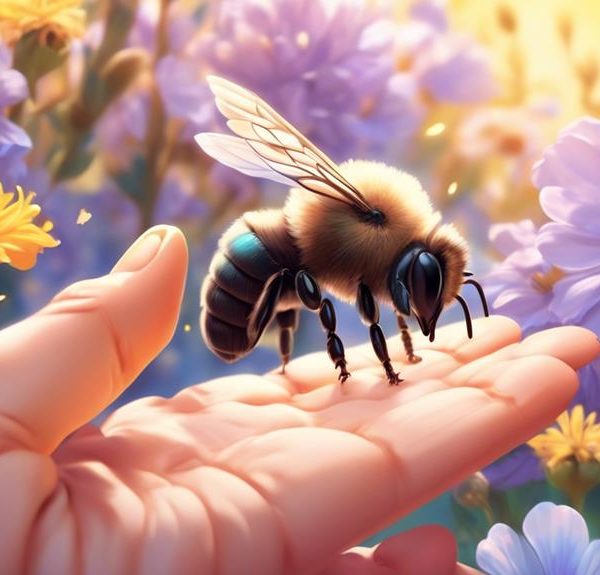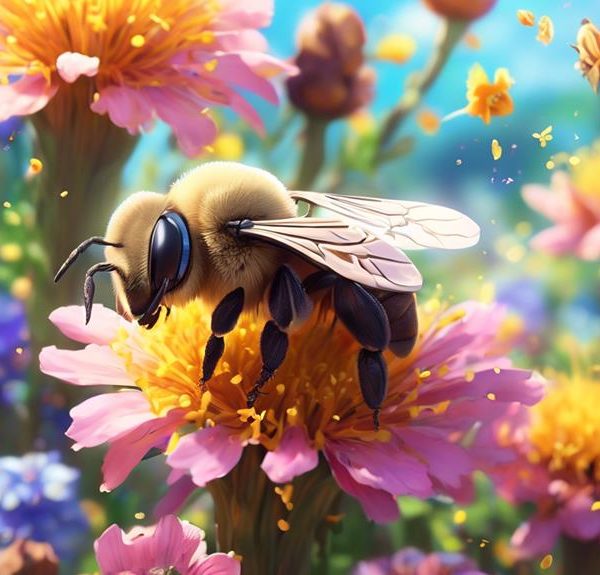Navigating the benefits of mason bees, we delve into their potential for transforming your garden into a thriving oasis of productivity.
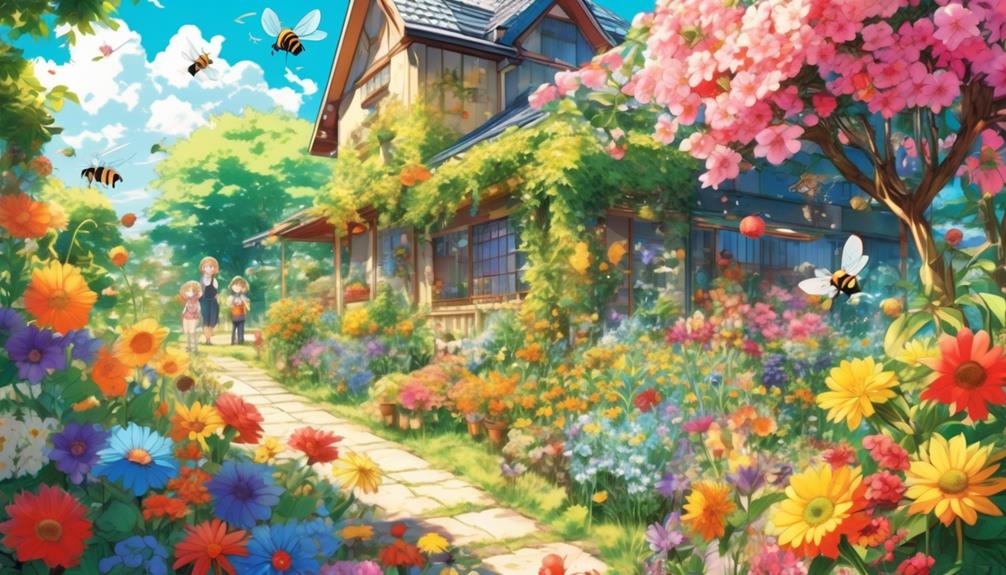
Are Mason Bees Good for Garden
By some strange coincidence, you've probably been buzzing around the idea of introducing mason bees into your garden without even realizing it. You're not alone in this; many gardeners are beginning to explore the potential benefits of these industrious little insects.
But are mason bees truly the key to a thriving, productive garden that we're all searching for? It's a question worth investigating, as there's more to these unassuming creatures than meets the eye.
Stick around, and we'll uncover the truth together, revealing a world of pollination and productivity that might just surprise you.
Key Takeaways
- Mason bees are highly efficient pollinators, with one mason bee able to do the work of 100 honeybees.
- Mason bees are safe to be around, as they are non-aggressive and rarely sting.
- Mason bees play a vital role in the propagation of many plants in gardens and ecosystems.
- Creating a welcoming environment for mason bees in your garden can enhance pollination and productivity.
Understanding Mason Bees
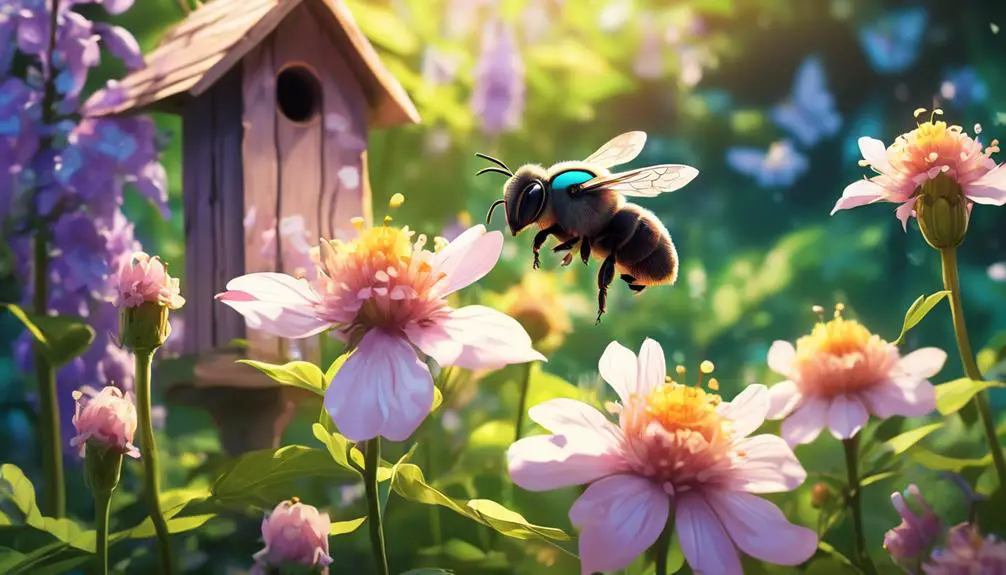
What exactly are Mason Bees, you might ask? They're a species of solitary bees, so named because of their unique nesting behavior. Unlike honeybees that live in colonies, mason bees live alone, each female constructing her own nest. They're notorious for their nesting habits, using mud to seal off their nests, much like a mason would use cement. Hence, the name 'Mason Bees'.
You'll find them in various parts of the world, including North America, Europe, and Asia. They're small, typically measuring between 6 and 13 mm in length, and their bodies have a metallic sheen, ranging in color from green-blue to black. They're non-aggressive and rarely sting, making them safe around children and pets.
They're also extremely efficient pollinators. A single mason bee can do the work of 100 honeybees, making them invaluable to our food systems. They're attracted to fruit trees, flowers, and other plants that produce nectar and pollen. You're not just helping these wonderful creatures by hosting them in your garden, you're also supporting the biodiversity that's essential for a healthy ecosystem.
The Life Cycle of Mason Bees
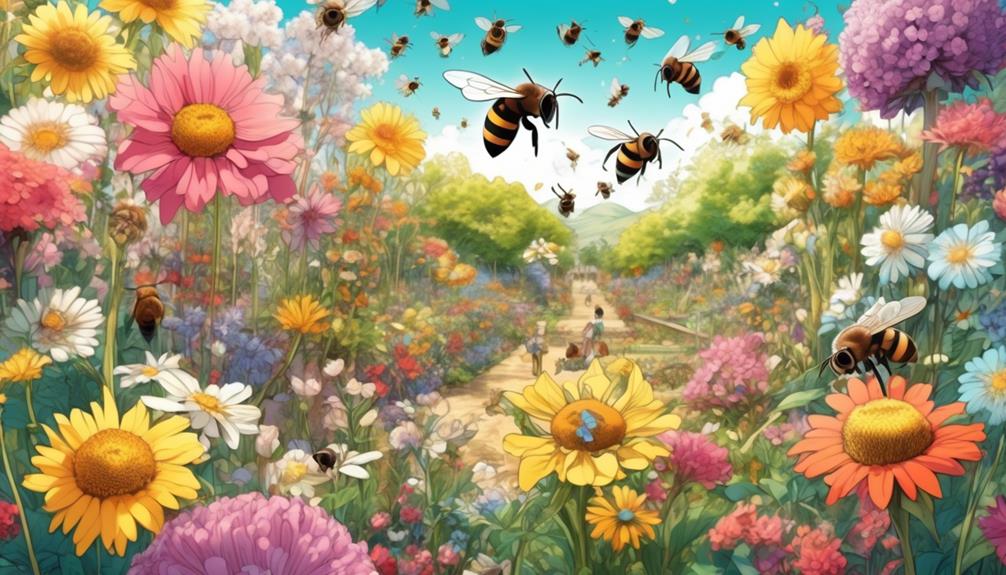
Having appreciated the unique traits and behaviors of Mason Bees, let's now unravel the fascinating journey of their life cycle.
You see, it all begins in early spring, when adult females emerge from their winter retreats. They're on a mission to mate and lay eggs. After mating, the female bee scouts for a suitable nesting site, often in pre-existing holes in wood or hollow stems. Once she's found the perfect spot, she starts constructing mud partitions to create individual cells within the nest.
Each cell is filled with pollen and nectar, forming a nutritious meal for the larva that'll hatch from the egg she lays there. Once an egg is deposited, she seals off the cell with more mud, hence their name ‘Mason'. This process is repeated until the entire tunnel is filled with cells.
Over the summer, the eggs hatch into larvae, who feast on the pollen and nectar stores before spinning a cocoon and entering the pupa stage. By late fall, fully formed adult bees are ready, but they remain in their cocoons throughout winter, awaiting the warm temperatures of spring to start the cycle all over again.
Mason Bees and Pollination
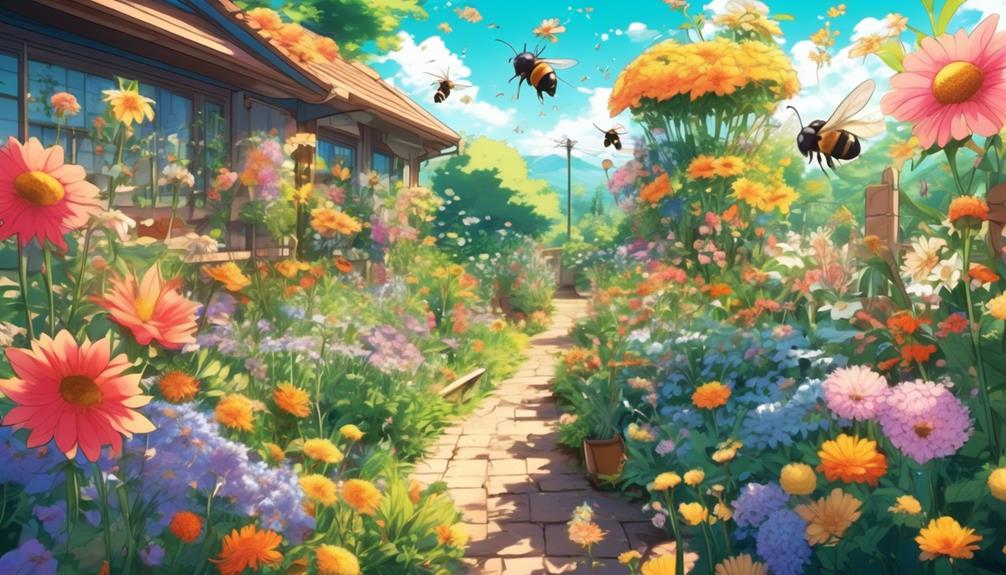
Now, let's delve into the pivotal role Mason Bees play in pollination, a process vital for the propagation of many plants in our gardens and ecosystems. Unlike honeybees that carry pollen on their hind legs, Mason Bees transport pollen on their furry underbellies. When they visit a flower, the pollen sticks to their abdomen, and as they move from flower to flower, they leave a trail of pollen behind, facilitating cross-pollination.
You see, these bees are solitary and don't live in hives. They don't make honey or beeswax, therefore, they're not distracted by the need to feed a large colony. Their sole focus is on pollinating flowers, making them more efficient pollinators than honeybees. In fact, it's estimated that a few hundred Mason Bees can do the work of thousands of honeybees!
Furthermore, they're non-aggressive and only sting when threatened. Thus, you won't have to worry about them causing harm to you or your family.
Benefits of Mason Bees in Gardens
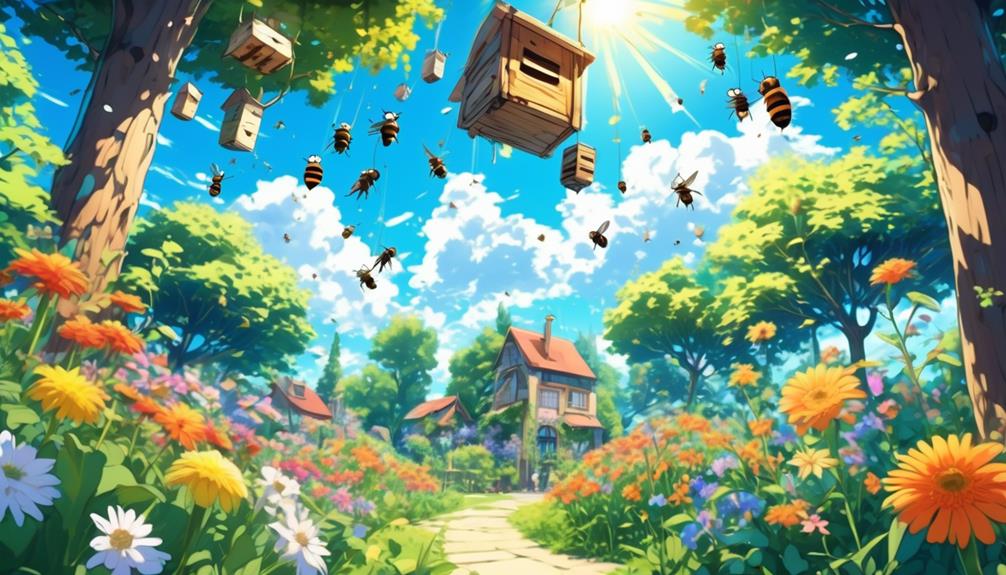
Understanding the efficiency and non-aggressive nature of Mason Bees, you might be eager to learn about the specific benefits these pollinators can bring to your garden.
Firstly, Mason bees are excellent pollinators. They're solitary creatures and spend their time working, not building hives. Each bee visits numerous blossoms per day, which significantly boosts the pollination process. They've a unique 'belly-flopping' method of gathering and depositing pollen, which is more effective than that of other bees.
They're also safe to be around. Unlike social bees, Mason bees don't have hives to protect, so they're less likely to sting. You can observe them up close without any fear.
Additionally, they're adaptable and resilient. They can thrive in various climates, making them beneficial for gardens in different geographical locations. They also start their work early in the spring, even in colder temperatures.
Lastly, Mason bees are relatively unaffected by the Colony Collapse Disorder that's decimating honeybee populations. As such, they're a long-term, sustainable option for pollination in your garden.
Attracting Mason Bees to Your Garden
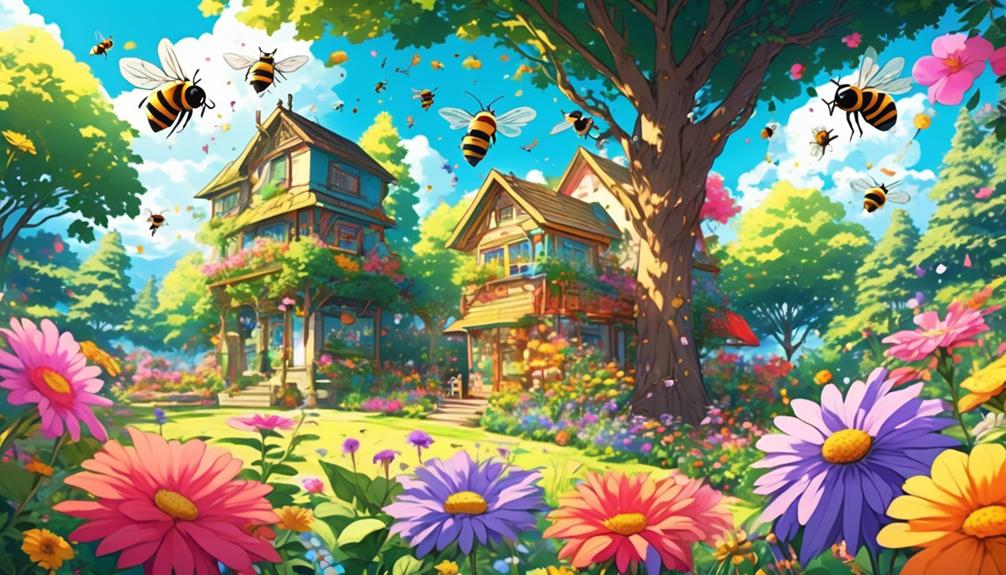
If you're keen to welcome these proficient pollinators into your garden, there are several strategies you can employ to attract Mason bees.
First, it's crucial to provide suitable nesting sites. Mason bees aren't hive builders; they're solitary insects that prefer pre-existing cavities. You can purchase a ready-made bee house or even make your own by drilling holes into untreated wood blocks.
Second, these bees need mud to seal their nests. So, ensure there's a damp patch of bare soil nearby. If your soil is sandy or heavy clay, you might want to introduce a small mud pit for them.
Third, Mason bees are early spring pollinators, so plant early blooming plants. They're particularly fond of fruit trees and flowering shrubs.
Lastly, limit pesticide use. These chemicals can be detrimental to Mason bees. Instead, opt for organic pest control methods.
Potential Downsides of Mason Bees
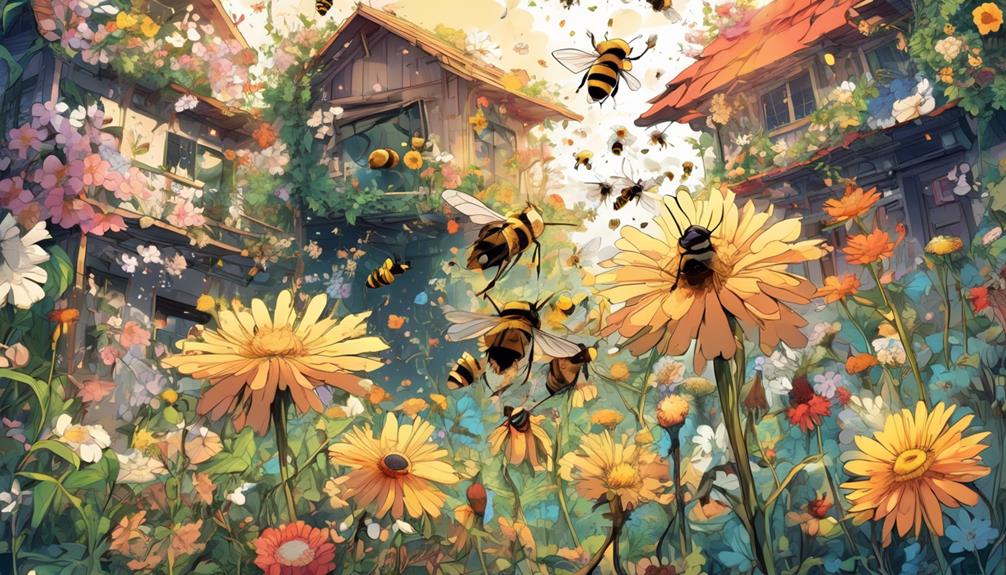
Despite their numerous benefits, there are a few potential drawbacks to having Mason bees in your garden that you should consider.
For starters, these bees can be quite territorial. If you've got a small garden, you might find their aggressive behavior towards other pollinators a bit unsettling.
Mason bees don't produce honey, so if you're looking for a honey-producing pollinator, you'll be disappointed. They also don't live in colonies, which means you won't see large numbers of them buzzing around your garden. This can limit their effectiveness as pollinators, particularly if you have a large garden.
Another concern is their nesting habits. Mason bees are solitary and prefer to nest in small holes, often in wood. If you're not careful, they could end up nesting in the wooden structures of your home or garden shed. This could lead to structural damage if left unchecked.
Lastly, while Mason bees are generally harmless to humans, they can sting if threatened. Their sting isn't as painful as that of a honeybee, but it can still cause discomfort, particularly to those with bee sting allergies. So, while you'll appreciate their pollination, you'll want to exercise caution around them.
Frequently Asked Questions
What Are the Common Predators of Mason Bees?
Yes, you're right to ask about mason bees' predators. They indeed have quite a few. Birds, spiders, and wasps often prey on them. Even some species of beetles, like the checkered beetle, aren't beyond feasting on these bees.
Besides these, mason bees also fall victim to parasitic mites and fungi.
It's important to monitor your mason bees for these threats to ensure their survival and continued garden productivity.
How Do Weather Conditions Affect the Life and Productivity of Mason Bees?
Yes, Mason bees are excellent for gardens! They're more effective pollinators than honeybees, so they'll help your plants thrive.
They're also gentle and unlikely to sting, making them safe around children and pets.
Plus, they're solitary, meaning they won't build large hives. Instead, they'll nest in small holes, often in wood or hollow stems.
What Is the Lifespan of a Mason Bee?
You're curious about the lifespan of a mason bee, aren't you? Typically, these industrious insects live for about 6 to 8 weeks.
They emerge in the spring, mate, and then the females lay eggs. Each egg hatches, goes through its lifecycle within the nest, and enters dormancy over the winter.
Can Mason Bees Be Harmful to Humans or Pets?
You're probably wondering if mason bees can be harmful to humans or pets. The answer's no. These bees are non-aggressive and rarely sting unless they're threatened or trapped. Their sting isn't potent and doesn't cause severe reactions in people or pets.
In fact, they're beneficial insects that pollinate plants more effectively than honeybees. So, you don't have to worry about mason bees causing harm. Instead, appreciate them for their crucial role in our ecosystem.
How Do Mason Bees Interact With Other Bee Species in the Garden?
You're likely to observe harmonious relations between mason bees and other bee species in your garden. Mason bees don't compete for resources with other bees. Instead, they're efficient pollinators that complement the work of other species.
They're solitary, so they won't disturb communal hives. They're also gentle, posing no threat to humans or pets.
Conclusion
So, are mason bees good for your garden? You bet they are. They're ace pollinators, boosting your plant's productivity. They're friendly, non-aggressive bees, a joy to have around.
Sure, they might cause minor damage to wooden structures, but the benefits outweigh any potential downsides. Attracting them is simple too.
Remember, a garden buzzing with mason bees is a happy, healthy garden. So why not invite these little pollination pros to your green space?

